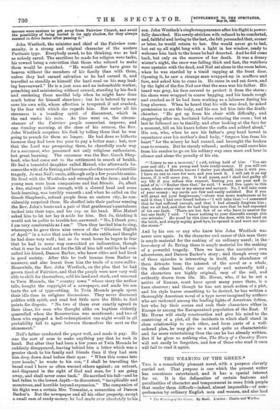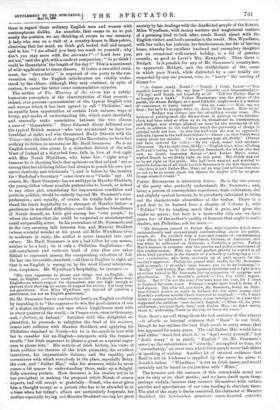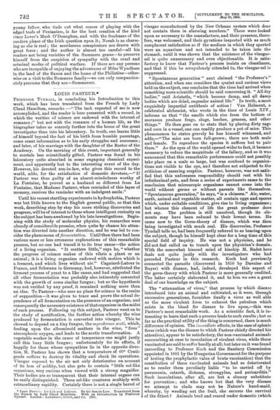THE WEARING OF THE GREEN.* Tats is a remarkably pleasant
novel, with a purpose cleverly carried oat. That purpose is one which the present writer has sometimes entertained, and it has a special interest for us. It is the delineation of certain features and peculiarities of character and temperament in some Irish people that render them difficult—indeed, almost impossible—of comprehension by ordinary English men and women, and also lead them to regard those ordinary English men and women with contemptuous dislike. An anecdote, that seems to us to put neatly the position we are thinking of, occurs to our memory. A lady who was on a visit at a country-house in Hampshire, observing that her maid, an Irish girl, looked dull and moped, said to her, " I am afraid you keep too much to yourself ; why don't you stay more with the servants ?"—" Lord love you, ma'am," said the girl, with a smile of compassion ; " do ye think I could be thranslatin' the length of the day ?" This is a sentiment of wide application to many classes. It is also a one-sided senti ment, for " thranslatin" is required of one party to the conversation only ; the English interlocutors are readily understood by the others, although they may continue, in spite of custom, to cause the latter some contemplative surprise.
The author of The Wearing of the Green has a subtlyhumorous perception of the characteristics of that present— indeed, ever present—presentment of the typical English man and woman which it has been agreed to call " Philistine," and
an equally keen appreciation of certain Irish natures, ways of living, and modes of understanding life, which must inevitably and eternally make association between the two classes a case of "thranslatin'." Since Edmond About delivered over the typical British matron—who was accustomed to have her breakfast at eight, and who threatened Hadji Stavros with the
Times—into the hands of the King of the Mountains, we have had nothing in fiction so amusing as Mr. Basil Summers. He is an English tourist, who comes to a disturbed district of the wild West of Ireland at a disturbed time, falls in love at first sight with Miss Norah Wyndham, who hates him " right away "
because he is shooting birds (her opinions on that subject " are so strong that her idolising father had always to poach his own pre serves furtively and feloniously "), and is taken by the country for " Buckshot's Secretary " come down as a " Castle " spy. Of course, Mr. Basil Summers has an antitype in Maurice Studdert, the young fellow whose possible pretensions to Norah, or indeed to any other girl, considering his impecunious condition and perilous politics, would be entirely beyond Mr. Summers's comprehension ; and equally, of course, he totally fails to understand the frank hospitality to a stranger of Norah's father—a gentleman in manifest difficulties—and the fearless friendliness of Norah herself, an Irish girl among her "own people," to whom the notion that she could be suspected or misinterpreted could not possibly occur. In his portraiture of Mr. Summers, and
in the very amusing talk between him and Maurice Studdert (whose scornful wonder at his guest old Miles Wyndham tries to moderate in vain), the author is never tempted into cari
cature. Mr. Basil Summers is not a bad fellow by any means, neither is he a fool ; he is only a Philistine Englishman—the self-complacent and cocksure kind of man that one takes Bildad to represent among the exasperating exhorters of Job. He has one invariable standard,—all that is English is right, all
that is an-English is wrong, or, by the most liberal interpretation, suspicious. Mr. Wyndham's hospitality, for instance:— "His very eagerness to please and oblige was un-English. At least, no English gentleman could be so civil. No doubt there were Englishmen whose respect for themselves was not high enough to prevent their showing an excess of respect for others ; but they were not gentlemen. Now Miles Wyndham was beyond all question a gentleman, but not an English gentleman."
So Mr. Summers has to condone his host's un-English cordiality by imputing it to "the eagerness to win the good opinion of one of a higher civilisation and race which Englishmen meet with in every quarter of the world,—in France even, even in Germany, and, a fortiori, in Ireland." Satisfied with this delightful explanation, he proceeds to enlighten the land of his sojourn, comes into collision with Maurice Studdert, and applying his Philistine standard to Norah—for be is too much in love with her to consider her un-English—interprets with the funniest results " her Irish eagerness to please a guest as a special eagerness to please him." His notions of Irish history, his views of Irish politics, his theories of the Irish peasantry, his excellent intentions, his impenetrable dulness, and the rapidity and
correctness with which everybody in the place, especially Betty, the cook, and " Father Mac," take his measure, while he never comes a bit nearer to understanding them, make up a delightfully amusing picture. How decorous is his resolve not to be too precipitate in making the proposal which Norah of course expects, and will accept so gratefully—Norah, who never gives him a thought except as a person who has to be attended to at a time when her father's affairs are particularly desperate, her mother especially trying, and Maurice Studdert causing her great
anxiety by his dealings with the disaffected people of the district. Miles Wyndham, with money matters and magisterial matters of a pressing kind to look after, sends Norah about with the English visitor, and fool's paradise is the result. Mrs. Wyndham, with her sulks, her jealousy, her fractiousness, her fits of leaving home, whereby her excellent husband and exemplary daughter get an occasional well-earned holiday, is a bit of genuine comedy, as good as Lever's Mrs. Kennyfeck. Then there is Bridget. Is it possible for any of Mr. Summers's countrymen to appreciate Bridget, and the truthfulness of the scene in which poor Norah, while distracted by a care totally unsuspected by any one present, tries to " hurry " the serving of
dinner P
"' dinner ready, Norah 2'—' Nearly, I think, father.'—' You couldn't hurry her a bit, my dear i'' (timidly and despondently)— 'I'll try,' said Norah, not hopefully at all. Tell her Father Mac is as hungry as a hawk' Father Macnamara was the priest of the parish, for whom Bridget, as a good Catholic, might make it a matter
of conscience to harry herself. Has he come Well, no, my dear ; but he'll be hungry when he does, I'll be bound. Here he is.'
Bridget was always late for everything except mass. The devices of putting back the dinner-hour or putting on the kitchenclock had been tried so often as to be threadbare to transparency, and Bridget now always allowed an hour for tho mendacity of the clock, in addition to the half-hour which the perversity of things in general made her lose. In this last half-hour she was as approachable as a tigress in the half-hour before her dinner ; so that Norah went warily about her mission. ' It's a quarter-past six, Biddy.' (Dinner had been ordered for 5.30.)—'13y the clock, miss,' with sardonic bitterness. By the right time, Biddy.'—' English time, miss,' alluding to Norah's taking so to the detested Sassenach, for whom she was now, no doubt, hastening dinner.—' And Father Mao's come,' replied Norah, to set Biddy right on this point. But Biddy was not to be set right on this point. She had been wearied and worried to provide delicacies of all kinds for this Sassenach in the last three days. Ah, then, it isn't Father Mac, Miss; an' ye may just tell him that sent ye not to be so onaisy about hie dinner, for maybe it'll be no great things when it comes.' "
Father Macnamara is admirably drawn. He is the one person of the party who perfectly understands Mr. Summers ; and, being a person of cosmopolitan experience, high cultivation, dry and slightly cynical humour, he is peculiarly calculated to bring out the characteristic absurdities of the visitor. There is a good deal to be learned from a chapter of Volume I., with " Politics " for its heading, much that is grim, and gives the reader no pause; but here is a taste—the only one we have space for—of the author's quality of humour that ought to make readers, not Philistine, ask for more :—
" Mr. Summers turned to Father Mac, with inquiries which were unintentionally and unconsciously condescending, about his parish, people, &c. He couldn't help a tone and manner of condescension even when he addressed a Frenchman, German, or American, still less when he addressed an Irishman, a Catholic, a priest. Father Mao's manner in response was the precise and polite complement of this condescension. With the most perfect gravity he replied to all these kind questions in the manner of a schoolboy undergoing a ricayore examination, who looks anxiously up at each answer for the master's approval. Plainly he passed with credit, for Mr. Summers said at length, ' I shouldn't have known you to be an Irishman.'— 'Really!' said Father Mac, with upraised eyebrows and a light in his eyes that looked to Mr. Summers like an expression of surprise and gratification. No, I shouldn't, indeed.'—' Yes, I'm Irish,' regretfully. But if I'm not the rose, I've been near the rose, for I lived in England for some years. Perhaps I might have lived it down if I had stayed. But after all, you know, Mr. Summers, being an Irishman doesn't matter so much in Ireland, for the same reasop that Hamlet's madness wouldn't bare mattered in England.'—' Oh, I don't think it matters much what country a man belongs to,' in a tone that suggested the addition, once he isn't English.'—' After all, its your misfortune, not your fault, dear,' said Father Mac, ' so don't worry about it,' addressing Norah as she rose to leave the room."
Now, there's an odd thing about the last sentence of this extract —it affords us internal evidence that " Basil " is not Irish, though he has written the best Irish novel, in every sense, that has appeared for many years. The real Father Mac would have said either "don't fret about it," or "don't worry yourself ;" but "don't worry " is as purely " English " (in Mr. Summers's sense) as the substitution of " directly," misapplied to time, for "immediately," an error into which Irish people never fall either in speaking or writing. Another bit of internal evidence that Basil is not an Irishman is supplied by the name he gives to Norah's father. " Wyndham " is not an Irish name, and would certainly not be found in conjunction with "Miles."
The humour and the sarcasm of this remarkable novel are not its only or its chief merits ; and we have dwelt upon them, perhaps unduly, because they connect themselves with certain puzzles and speculations of our own tending to elucidate them. The plot of the story is finely conceived, the character of Maurice Studdert, the hot-headed, generous, warm-hearted, patriotic young fellow, who finds out what comes of playing with the edged tools of Fenianism, is far the best creation of the kind since Lever's Mark O'Donoghue, and with the freshness of the modern phase of the Irish question upon it; Norah is as charming as she is real ; the murderous conspirators are drawn with great force ; and the author is almost too careful—all his readers not being varieties of the Summers genus—to preserve himself from the suspicion of sympathy with the cruel and criminal modes of political warfare. If there are any persons who are incapable of enjoying the adventures of Miles Wyndham in the land of the Saxon and the home of the Philistine—otherwise on a visit to the Summers family—we can only compassionately presume that they are—Summerses.
















































 Previous page
Previous page